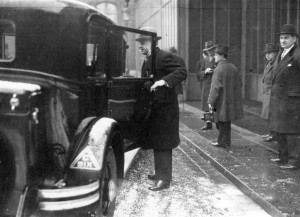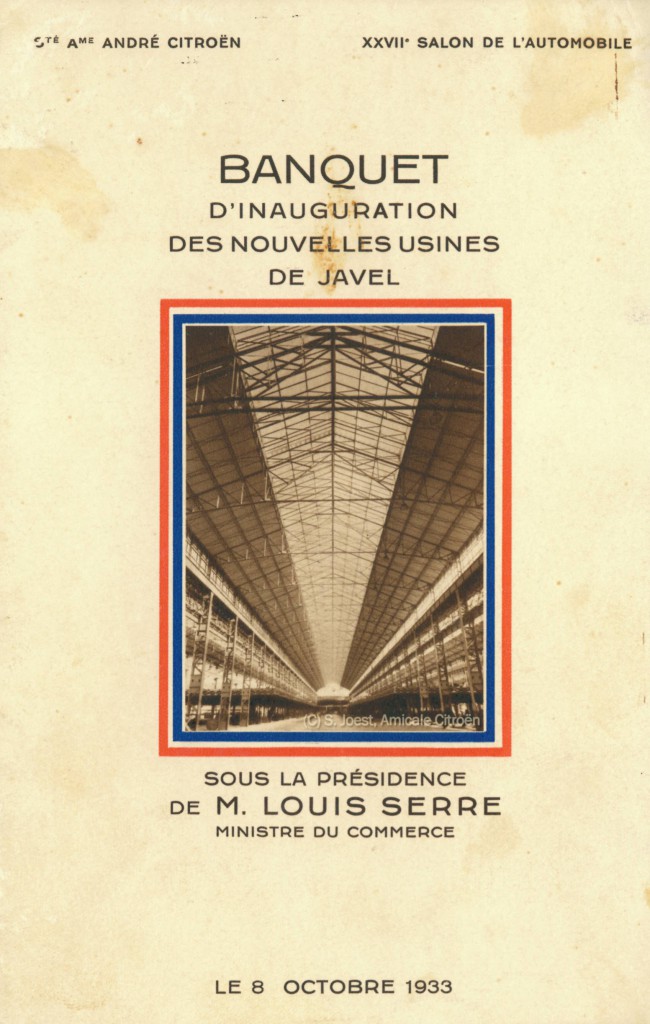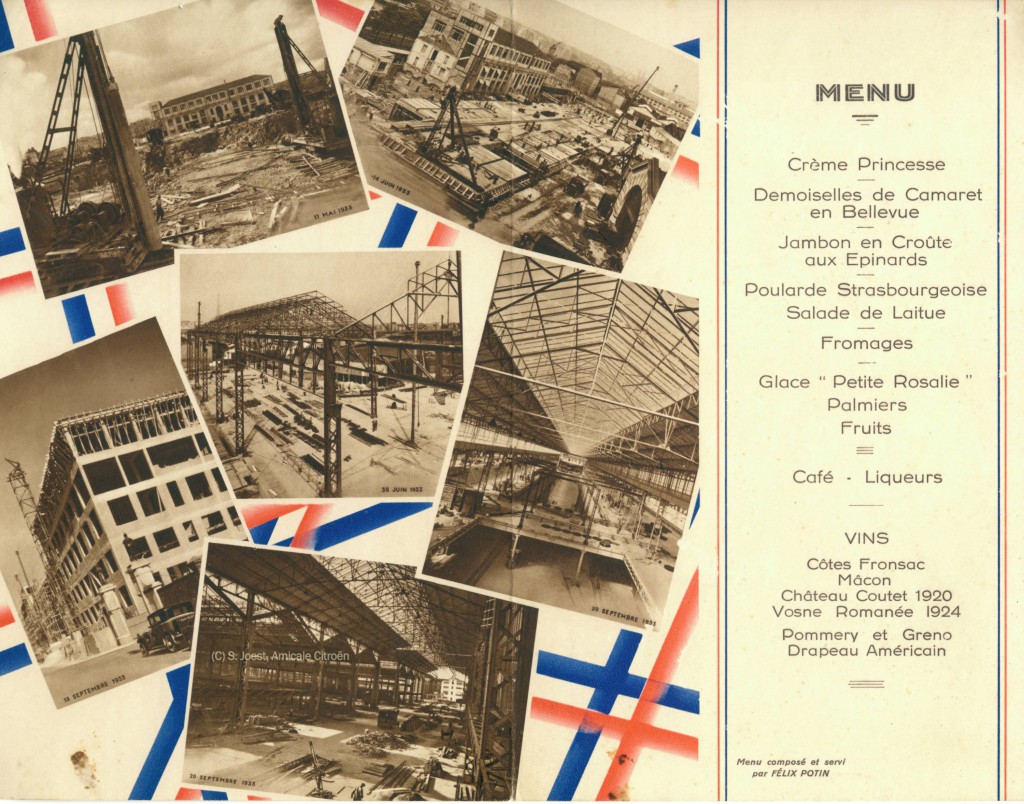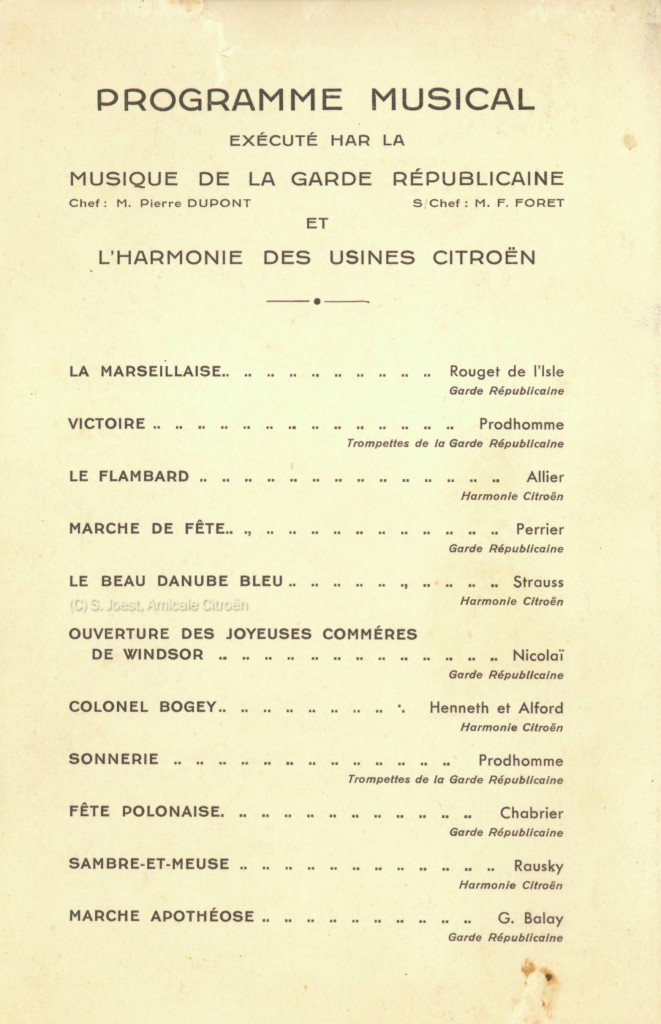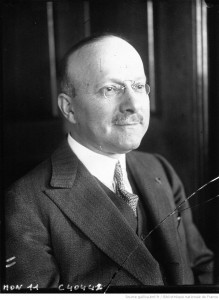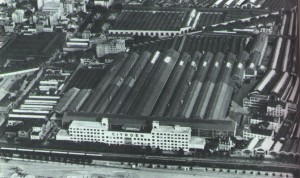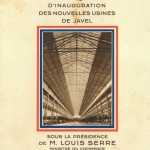
(English below)
Als eines der Zeitdokumente zum 80-jährigen Jubiläum des Traction Avant präsentieren wir an dieser Stelle die Einladung zur Einweihung von Europas modernster und grösster Automobil-Produktion seiner Zeit:
Der seit 1915 genutzte Produktionsstandort am Seineufer, dem berühmten “Quai de Javel” (15. Arrondissement im Südwesten von Paris) musste modernisiert werden, um mit dem geplanten Wachstum des Unternehmens Schritt halten zu können – schnell stellte sich heraus, daß die seinerzeitigen Produktionsanlagen der 20er Jahre nicht für die vorgesehene Massenproduktion dimensioniert waren.
Bei weiterhin laufender Produktion der bisherigen Typen gelingt es in der Rekordzeit von nur 5 Monaten, neue Anlagen für die rationelle Fertigung und Montage des zu erwartenden neuen Modells “Traction Avant” zu errichten. Die Banken drängen angesichts der angespannten wirtschaftlichen Situation des Unternehmens darauf, frühestmöglich in die Großserienproduktion einsteigen zu können. Die geplante Kapazität wird auf rund 360 Autos pro Tag dimensioniert (1934: 56.123 Automobile werden in Paris produziert) und soll noch erweiterungsfähig sein: wie wir wissen, werden mehr als eine dreiviertel Million des “Traction” hier am Quai de Javel produziert werden!
Am 8. Oktober 1933 wurden die neuen Produktionshallen feierlich in Betrieb genommen. Unter der Schirmherrschaft von Louis Serre, Industrie- und Handelsminister in der Regierung von Édouard Daladier (Präsident der Republik war Albert Lebrun) fand das Bankett statt.
Die kulinarischen Genüsse:
* Crème Princesse
* Demoiselles de Camaret en Bellevue
* Jambon en Croûte aux Epinards
* Poularde Strasbourgeoise avec Salade de Laitue
* Fromages
* Glace Petite Rosalie, Palmiers et Fruits
und als Weine wurden zu den jeweiligen Gängen kredenzt:
* Côtes Fronsac
* Mâcon
* Château Coutet 1920
* Vosne Romanée 1924
* Pommery et Greno
* Drapeau Américain
Citroën unterhielt damals ein eigenes Werksorchester, das abwechselnd mit dem Orchester der Nationalgarde die Gäste unterhielt, und neben den amüsanten Klassikern wie “an der schönen blauen Donau” und dem “Colonel Bogey” Marsch durfte natürlich nicht die Marseillaise, die französische Nationalhynme, fehlen!
Zum Schluß wurde der imposante siebenminütige “Marche Apotheose” von Guillaume Balay gespielt – der Höhepunkt der Eröffnungszeremonie!
Schließen wir für einen Moment die Augen und versetzen uns zurück in diese Zeit und den möglichen Ablauf dieses besonderen Abends, an den heute einige Citroënisten erinnert werden……
Hier die Dokumente im Scan, (C) Archive der Amicale Citroën Deutschland:
Weitere Bilder aus den Frühtagen des Quai de Javel sind im Online-Archiv der französischen Nationalbibliothek zu finden:
Wer heute die Reste der ehemaligen, rund 22 Hektar grossen Produktionsstätte im Pariser Südwesten sucht, wird enttäuscht sein – der berühmte Quai de Javel ist zu einem Park umgewandelt, und nur wenige Indizien sind noch zu finden, die auf die Historie und für Paris und Automobiles Citroën wichtigen Meilenstein der industriellen Entwicklung hinweisen.
[osm_map lat=”48.841″ lon=”2.275″ zoom=”15″ width=”600″ height=”450″ marker=”48.84095,2.2753″ marker_name=”wpttemp-red.png”]
—–
80 years of Traction Avant: Inauguration of the new Paris factory at Quai de Javel
As one of the historical documents related to the 80th anniversary of the Traction Avant, we present to you here the invitation to the inauguration of Europe’s most modern and largest automotive production of its time:
While André Citroën had established his production facility since 1915 at the Seine riverside, known as the famous “Quai de Javel” (at the 15th district in the south-west of Paris), the site had to be modernized to keep pace with the anticipated growth of the company – it quickly turned out that the production capacity as it evolved during the 1920s were not dimensioned to suit the intended mass production.
While continuing the current production of the actual model range, the execution of this industrial groundbreaking renovation was done in a record-breaking time of only 5 months, now hosting new equipment for the efficient large-scale mass production and assembly of the anticipated new model to be build – the “Traction Avant”. Financially challenged by the difficult economic situation of the company, the banks were putting enormous pressure onto the project and insisted to be able to go into mass production as early as possible. The planned capacity was dimensioned to deploy around 360 cars per day (1934: 56.123 cars were produced in Paris) and was also prepared for a potential production enlargement: as we know, more than three quarters of a million of “Traction” were produced here at Quai de Javel!
On 8 October 1933, the new production halls were solemnly inaugurated. Under the patronage of Mr. Louis Serre, Commerce and Industry Minister in the government of Édouard Daladier (President of the Republic was Albert Lebrun) the banquet was held at the Citroën headquarters.
The culinary delights:
* Crème Princesse
* Demoiselles de Camaret en Bellevue
* Jambon en Croûte aux Epinards
* Poularde Strasbourgeoise avec salade de Laitue
* Fromages
* Glace Petite Rosalie, Palmiers et Fruits
and well as best-of-breed wines were complementing this premium dinner:
* Côtes Fronsac
* Mâcon
* Château Coutet 1920
* Vosne Romanée 1924
* Pommery et Greno
* Drapeau Américain
Automobile Citroën entertained at that time a dedicated company orchestra, known as the “Harmonie des Usines Citroën”, and entertained the guests alternating with the orchestra of the National Guard, and in addition to the amusing classics like “on the Beautiful Blue Danube” and the “Colonel Bogey” march of course the Marseillaise was not to be missed!
Finally, the well-known seven-minute “Marché Apotheosis” by Guillaume Balay was played – complementing the final execution of the opening ceremony!
Let’s close our eyes for a few seconds and put ourselves back to that moment time, imaging the great atmosphere and spirit during this special evening that will be remembered until today by quite a number of Citroënists worldwide……
🙂
We’d be happy to hear from you further info about the “Usines Citroën” as they help our many-thousand-readers to learn more about this era. Please leave a comment below. Thank you!
